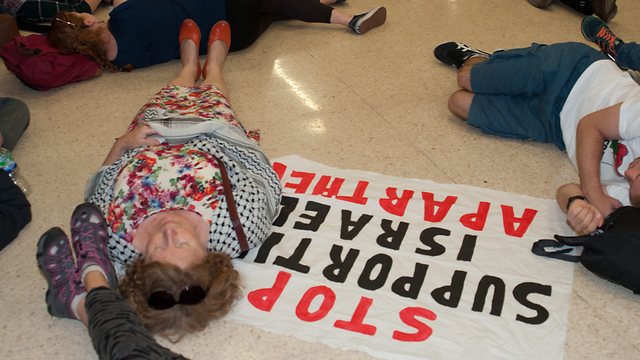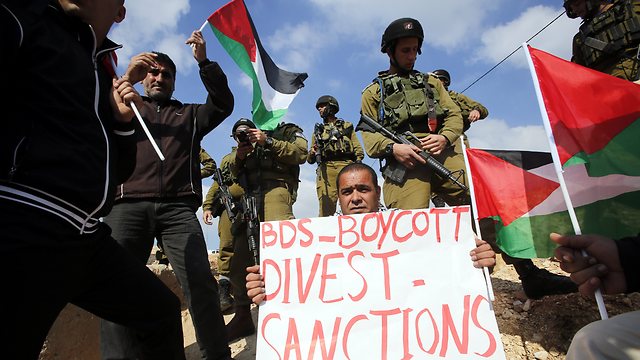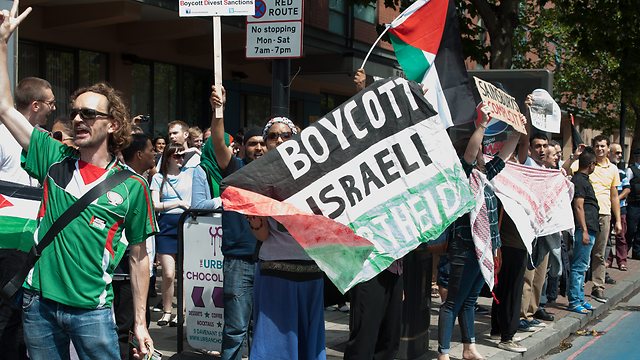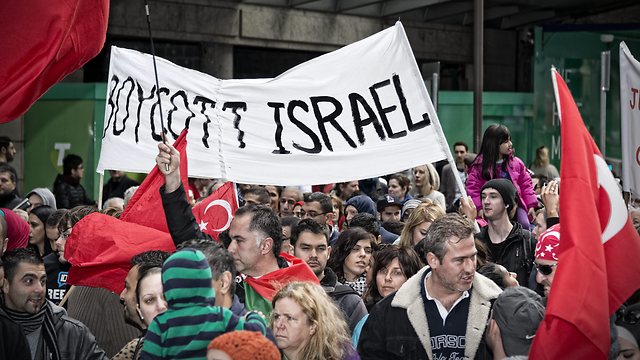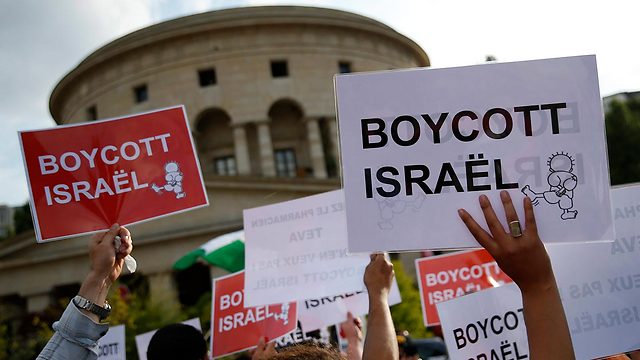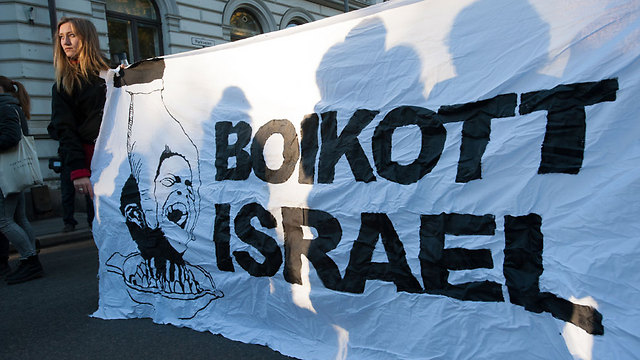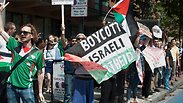
Inside the BDS lions' den
Disguising herself as a fervent and devoted BDS supporter, Adi Cohen participated in rallies, speeches and panels during Israel Apartheid Week and discovered their recruitment methods and how they silence their opposition.
I sat for a full hour, tapping my foot restlessly.I was in a small East London room that serves as the offices of the Friends of Al-Aqsa. It was relatively empty and lit by an overly white fluorescent light bulb. Oil-soaked food lay on a table in the center of the room. That was the first time I felt scared.
After surreptitiously participating in BDS activities for a few of weeks, I could already identify the regulars at events, be they organized by BDS or by any of the other organizations that work alongside them. The Friends of Al-Aqsa is one of them. Last Saturday, they held a conference and called on volunteers to register. So I did just that. At this point, it seemed to me that my face had become familiar to them, as well.
We sat in a small circle. I was the only woman in the room, and also the only non-Muslim. Despite the smiles and kindness of those around me, I was, for the first time, afraid to reveal my background, even though I had declared that I shared the goals of the people around me. I was frustrated with myself for having this fear. Mostly, I was afraid that they wouldn't believe me.
I took a deep breath, and I stuck to my usual cover story when they asked who I was and what I was doing there. "I'm a former Israeli. I was shocked by what was happening in Israel, so I left in 2012 to avoid the army. Since then, I can't go back," I told them. I added that, recently, as a student, I had decided to join their struggle.
I gave the open-eyed circle of activists exactly what they wanted to hear, with a strained smile and a hope that they would buy my story. At first they opened their eyes in surprise. Immediately after, though, they smiled with satisfaction that they now had a new card to play, the trump—"one of them" on their side.
The teenager beside me surprised the circle of volunteers. Only 16 years old, Omer had travelled an hour and a half from his home outside of London specifically to attend this meeting. His shirt matched that of the event organizer: a white T-shirt with a big red heart and, in the center, a map of Israel depicted as a Palestinian flag.
After a short introductory chat, they showed a promotional video about the organization. I immediately recognized the opening section of the video: a demonstration in front of the Israeli embassy in London during Operation Protective Edge, which was organized by the Friends of Al-Aqsa.
Hundreds of furious activists on the screen shouted loudly, calling for a free Palestine "from the river to the sea." The hate in their eyes, the crowd's loud, unpleasant cries, and the satisfied crowd of volunteers sitting beside me were causing a lump in my throat. At the end of the meeting I took another oily sweet and left briskly without looking back. This was the last time I sat among them.
The main goal of the BDS organization is to put pressure on the State of Israel to stop its violation of Palestinian rights. They do this by calling for a boycott, divestment and sanctions. The BDS campaign is focused on three central tracks: trade relations, academia, and culture.
For example, huge department stores in the UK, such as John Lewis, Sainsbury's, and the Co-operative removed products from their shelves that were marked as being produced in the settlements. The movement also was successful with a large number of companies, such as SodaStream and G4S, which were marked as partners in the Israeli occupation.
The International Teachers Association, the University and College Union, the Green Party of England and Wales, and over a thousand artists and cultural figures from around the United Kingdom joined its ranks. The latest achievement, and apparently the most meaningful, was in June 2015, when the British National Union of Students expressed support for BDS.
For the past decade, around every February and March, the BDS movement has held "Israeli Apartheid Week" in the UK. The purpose of this week is to "educate" the population about the realities of Palestinians' lives while calling them to action and to the fight. In other words, this is an intense, week-long recruiting campaign for the BDS movement on campuses.
Ahead of the last Apartheid Week, as an Israeli journalism student in Britain, I found myself facing a confusing paradox: between my faith in freedom of expression, and the unpleasant feeling in my gut that this was no more than a campaign of hatred and incitement against my country; between legitimate criticism of the occupation, and using it as a cover to oppose Israel's very right to exist.
February 22: Israeli Apartheid Week opening event, University of London
Trying to find an answer to my questions, I decided to enlist in the ranks of the BDS movement while in the guise of an ardent supporter. The first event I attended was held at the SOAS (School of Oriental and African Studies) at the University of London to mark the opening of Israeli Apartheid Week. I bit my lip at the campus entrance, and I put a sticker on my shirt that said "Boycott Israel."
I entered the lecture hall, which was filled to capacity with about 300 people: a mix of students and older adults, at least half of them British. An Arabic melody opened the event and silenced the excited crowd, as the evening's moderator, Rafeef Ziadah, went to the microphone.
Ziadah is known as a Palestinian refugee, poet, singer and activist who currently lives in London. Ziadah chuckled at the attempts to silence the movement and at Israel's counterclaims, and stressed that this was the time to be united, more so now than ever before.
Ziadah opened, "(The events of Israeli Apartheid Week) elegantly frame Israel for what it is: a settler colonial state that thus far oppressed the Palestinian people, denied our right to return to our homeland, and all under a brutal military occupation."
On the panel were Steven Salaita, a Palestinian-American professor, Sahar Francis, a Palestinian activist for prisoners' rights, and Malia Bouattia. Malia opened the panel and spoke of the movement's struggle against the current British government's restrictions. She spoke of its common interests with the State of Israel and pointed out the similarity of Cameron and Netanyahu's strategies in justifying their actions while frightening the citizenry with "invisible terrorists."
Zionists' excuses today are tiring, said Malia. She described them as clichés: "What about Saudi Arabia? What about Lebanon?" Arguments like these, she said, illustrate the poverty of the Zionist imagination. Malia said that the BDS movement was dealing with an opposition that is bankrupt politically and creatively. According to her, BDS's success is only a matter of time.
When I felt that it couldn't get any worse, Ms. Francis began her speech. Most of her research and work deals with the issue of Palestinian political prisoners in Israel. Her lecture was a smorgasbord of horror stories that were largely false. She spoke of laws that forbid the publication of any book or article which opposes the occupation; she described the hundreds of thousands of Palestinians that were arrested, with most of them not being terrorists at all, but rather academics, students and writers, whose only crime was opposition to the occupation and protesting.
Francis described the harsh conditions in which prisoners are held in Israeli jails, often without trial at all. She shocked the audience with stories of Palestinian children being held in harsh conditions. Francis saved the best of the horrors for last: while she did take the time to note that it was not yet certain or proven, she shared with the audience the increasing suspicions that Israel was harvesting organs from Palestinian corpses before returning them.
February 26: a panel on the academic boycott, London School of Economics
The next stop was a panel on the academic boycott at the London School of Economics (LSE). Abdullah and I sat at tables in the lecture hall. Two regular students, we complained about the workload, the fatigue and the previous week. Individual visitors stayed in the hall, gathering in noisy small groups around us.
I already knew Abdullah well; he was a nice student with a wide range of knowledge and an impressive ambition for the struggle. Abdullah is a Palestinian originally from East Jerusalem with a Jordanian passport.
These days, he's working on his master's degree at the university, and he leads activities in support of the Palestinians, which include Israeli Apartheid Week.
When I told him in our first conversation that I was from Tel Aviv, he grinned and said that he had never managed to get through the checkpoints and reach the city. I almost blurted out an automatic apology. Instead, I smiled uncomfortably. I wrinkled my brow and asked, with the most innocent look that I could muster, about the lack of political discourse at BDS events.
Abdullah simplified things in his response, saying that if it seems like there are two sides and that we need to promote a dialogue, that is not the right thing to do. According to him, there aren't two sides, and it's pretty simple if you look at it that way.
This time, when I heard that reason for the umpteenth time, I realized for the first time that this is, perhaps, the essence of BDS. In direct talks with its members, I realized how deeply ingrained was the delegitimization of the idea of the Jewish State.
The event at LSE was all about the academic boycott. On the panel sat Brenna Bhandar, a law lecturer at SOAS; Salma Karmi-Ayyoub, chair of the British organization Lawyers for Palestinian Human Rights; and Jonathan Rosenhead, chair of the British Committee for the Universities of Palestine. Rosenhead said his presence as a Jew showed that not everyone who protests against Israel is an anti-Semite.
A young woman in the audience stood up and asked about the BDS movement's demands regarding the right of return. Gently, she asked about the fate of the Jewish State: after all, there are people in Israel who oppose the occupation but who still insist on its right to exist. At the end of her question, she said that she was Israeli.
The heads in the crowd turned to her and murmured amongst themselves. When no answer came from the panel, I couldn't help myself: I raised my hand. Insisting this time, I demanded to hear the movement's approach to the fate of the Jews. An Israeli, Ronnie Barkan, answered her by attacking, saying that no matter what the privileged people of Israel believe, BDS doesn't need their approval. I was surprised. Later, I learned that Barkan is an Israeli from Ra'anana who now lives in Italy. He's one of the founders of Boycott from Within, which brings together Israelis who are leading BDS boycotts across the world.
March 2: a panel at King's College
I had taught myself to look like one of them, often clapping and laughing along with the rest of the crowd. When I listened to Ronnie Barkan, I found this task challenging, verging on impossible. I recognized Ronnie at the King's College panel from the LSE event, where he attacked the very existence of the Jewish State. The panel at King's College focused on combining struggles of a political nature and on calling for an end to investing in Israel.
Last January, at the same university, a commotion broke out during a lecture by security expert and former Shin Bet director Ami Ayalon. When Ayalon urged university students to promote activities of peace, pro-Palestinian activists burst into the hall, threw chairs, broke windows and activated the smoke alarms. According to them, Ayalon is a "war criminal," and the mayhem was a protest of the platform he was given to speak. Apparently, due to the police investigation that the university has been dealing with since, the event that I attended was run in a careful fasion, bordering on boring.
It was impossible not to be impressed by the love and admiration that was heaped on Ronnie, from pictures with enthusiastic fans to conversations with students yearning to learn from the post-Zionist Israeli. Ronnie describes himself as privileged: a white, Israeli Jew. As such, he painfully described his struggle against the legal system where he is favored at the expense of the Palestinians, all in the name of the Jewish state.
Barkan argues that there are two types of Zionists: "rightists," who support ethnic cleansing, oppression and occupation, but who at least admit it, and "leftists," who talk about peace and values, but who are just as racist as the right.
Barkan convinced the students in the audience that the money that they pay in tuition is invested through the universities into companies that arm the Israeli military, and so they must protest.
This time, too, the audience brought up some some noticeable points. Amongst them was a statement from a quite elderly British woman, which drew overwhelming support from the crowd. She described as "absurd" the fact that English people who return from fighting in Syria are investigated for war crimes immediately, while Israelis who join the IDF are not investigated at all.
When the event was over, I joined the circle of fans (mostly of Jewish students) that gathered around Barkan, and I politely complimented him on his stirring lecture. As usual, I asked innocently about the fate of the Jewish people the day after the end of the occupation and the realization of all the BDS movement's dreams. After Barkan repeated several slogans, he said that he is not against the idea of a Jewish state—he just doesn't really care. In his words, "They will have to deal with it!"
March 11: a lecture at the University of Westminster
Ben White's lecture at the University of Westminster, which I currently attend, was held on Friday evening and was titled "Does apartheid still exist?" I knew the name Ben White from his book, Israeli Apartheid: A Beginner's Guide.
Ten rows of enthralled students sat and listened to the usual comparison that BDS makes between Israeli policies towards the Palestinians and the white settlers' regime in South Africa. White stressed that the reality is that Israel is even worse, since this policy is now recognized as a crime under international law.
The apartheid arguments refer to discrimination based on race, to occupation, and to ethnic cleansing. White attributes the ethnic cleansing to the Nakba of 1948. According to him, within the borders of what was to become Israel, 90% of Palestinians were brutally expelled by the Israeli military in order to create a Jewish majority by force.
I met David Collier at most of the events that I attended. David is a Zionist Jew. He continually reviews the discourse and the incitement against Israel since the days of the second intifada at the start of the new millennium.
For the past year and a half David has run the blog, "Beyond the great divide," in which he presents his experiences from the incitement events that he attends. Collier claims that BDS is built on lies and a contrived narrative.
The movement, he said, often distorts the sequence of events in history to justify the present activities of its members; but if they claim to be speaking for truth and justice, why not show the full story? They take a complex conflict and oversimplify it, he explained, drawing an analogy between the movement and a cult. BDS, according to Collier, hides behind the mask of human rights: it doesn't allow for a "trial," since the "verdict" has already been reached. The movement decided that Israel is to blame, and now meets to decide what the appropriate punishment is, he concluded.
Collier told of an event that he attended at UCL last week. He sat next to a young first-year student. She didn't know anything about the conflict, but, during a brief conversation with one of the organizers, she was warned that any argument from the other side is "Zionist propaganda." Later, Collier recounted, she received manuals and videos: the promotional material required to call for a boycott. He wondered how he could introduce the real facts to this woman.
March 5: Friends of Al-Aqsa conference at LSE
We were asked to think about strategies. The dozens of people in the room were divided into six small groups. Together, we raised creative ideas for strengthening the campaign against Israel. At the table that I had joined, it seemed that everyone already know each other. Most of them, they told me, met via Twitter, where the anger over Operation Protective Edge first brought them together.
Ali, who was sitting next to me, said that the events in Israel were ten times worse than what happened in South Africa; according to him, at least the South Africans didn't use security checkpoints or murder. I nodded along with everyone.
Ali, originally an Iraqi Kurd, has lived in England for several decades. When he could not identify my accent, he asked where I was from. Ali insisted that I needed to tell people that so that they would like me more. He said that when a message comes from a Jew or Israeli, it's stronger. "Like Max Blumenthal, like Ronnie Barkan." I smiled at him and to myself, and I said that I knew.
Some of those present had already recognized me and smiled at me. The atmosphere was happy and energizing. Lots of supporters showed up at LSE on Saturday morning. The BDS workshop was held as part of the conference that the Friends of Al-Aqsa organized. A young man, curly-haired and assertive, conducted the brainstorming session. He taught us that the first step is education through lectures, films and explanatory books. He stated emphatically that we had to educate the public on Israeli apartheid and BDS.
One of the groups' representatives got up first and said that there are no better ambassadors for the BDS struggle than Palestinians themselves. Therefore, money needed to be raised for as many scholarships for them as possible. From my friends at the table, I learned that this is one of the movement's central techniques.
Another student recommended building more "checkpoints" in universities. Ali explained that a number of universities set up simulated checkpoints on campuses in recent weeks, getting people to dress up as IDF soldiers, to convey to students and passersby the daily life of Palestinians.
The curly-haired man walked between the tables and seemed quite satisfied. At the end of the workshop, he clearly demanded that we make sure to interfere with Israeli events and not allow them to be conducted. According to him, if we were to let them take place, we would be conveying a message of legitimacy and acceptance.
During the break between the workshop and the next lecture, the attendees were given tea and pita bread with olive oil and za'atar. Next to the refreshments was table holding a model of the Temple Mount, enclosed in glass. Next to it, on a keffiyeh-draped table, were items for sale that advertized the struggle: shirts, stickers, bracelets and key chains.
But it was the miniature boxing gloves that caught my eye, painted in the colors of the Palestinian flag. "You can hang them on your car's rearview mirror or on a keychain," said a young man who was standing across from me. My face expressionless, I turned and went into the hall.
Max Blumenthal's lecture was, for me, a hard punch to the stomach. Blumenthal is a Jewish-American writer and journalist and one of the BDS movement's most vocal activists.
Blumenthal began his lecture with stories about Operation Protective Edge: Israeli soldiers used Palestinian civilians as human shields, and the IDF announces its attacks, but prevents entire families from leaving their homes. He also claimed that Israel used 18,000 tons of explosives during bombings of Gaza during the operation. This amount, he contested, was larger than that used by the US when bombing Hiroshima during World War II. Gazans live in trauma, he said.
After successfully shocking the audience, Blumenthal continued justifying violence and terrorism, saying that one way to deal with this and the daily humiliations inflicted by Israel is to join the armed wings of Hamas.
He told of a group of Hamas fighters who were passing through one of the tunnels that they dug from Gaza to an Israeli kibbutz located near the border. The militants were armed and wore GoPro cameras on their helmets. When they reached Israeli territory, they shot at a group of Israeli soldiers and hurried back, having filmed everything and distributing the recordings later.
Blumenthal asked us to consider for a moment what message such an action conveyed. They really showed the occupiers, he declared, adding that he was sure that this inspired other Palestinians within Israel and in the West Bank.
I couldn't take it anymore. I got up and left. On my way out, I noticed the miniature boxing gloves again, and I was irritated by their presence even more. The ground that had been shaking beneath my feet the past few weeks suddenly stabilized.
 |
The BDS movement hides behind slogans of values and justice, but its wheels are greased with extremism, with encouraging a violent struggle, and, ever so quietly—also with anti-Semitism. If this is the kind of discourse that the BDS movement is fighting for in universities, I thought to myself while exiting the building into a rainy London Saturday, then—in the name of my freedom of expression—I'll stand up and say: We can't let this go on.











